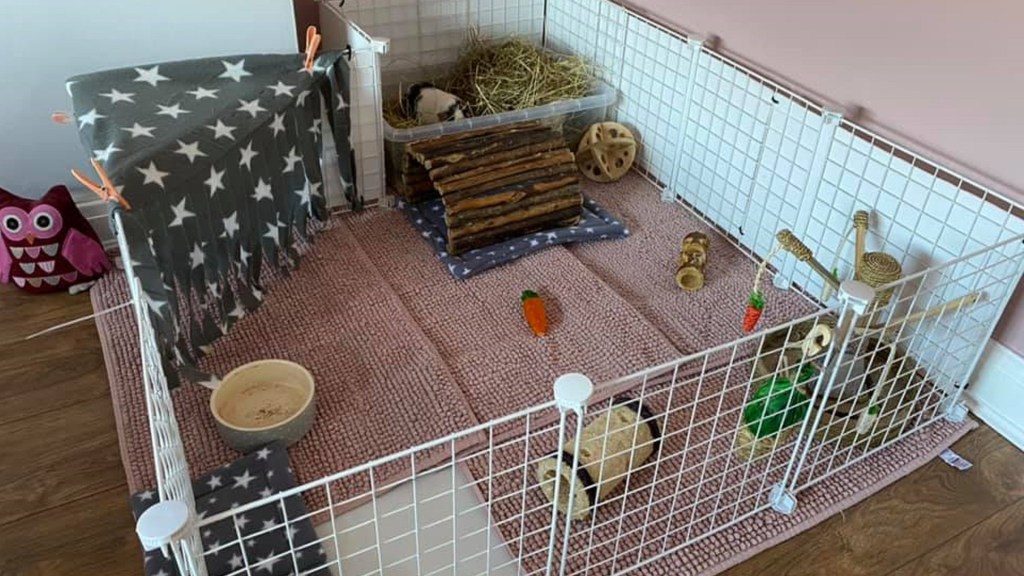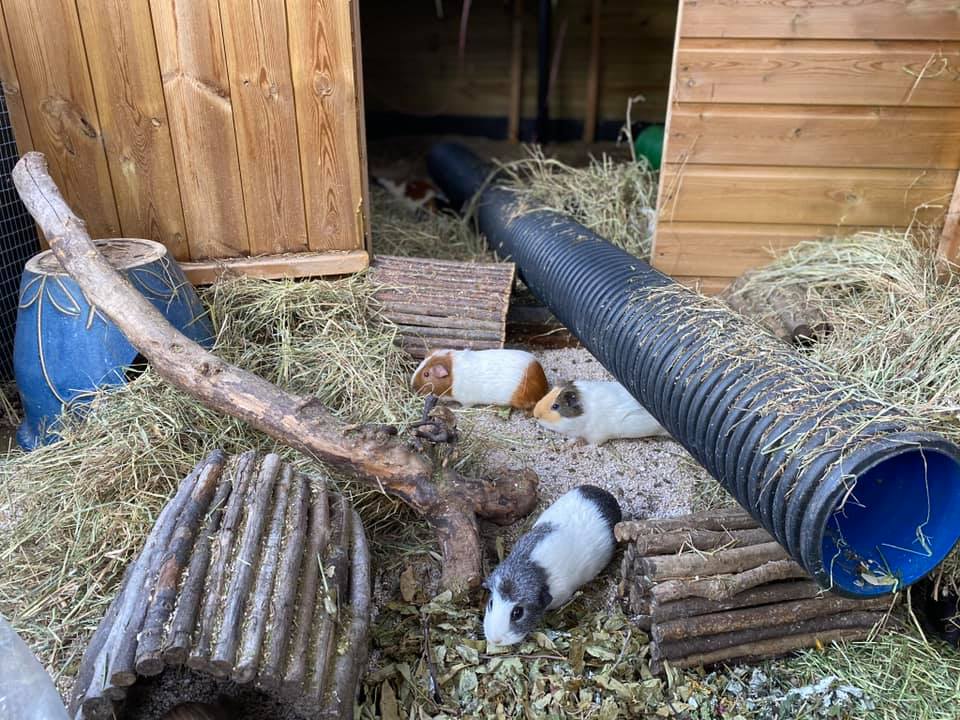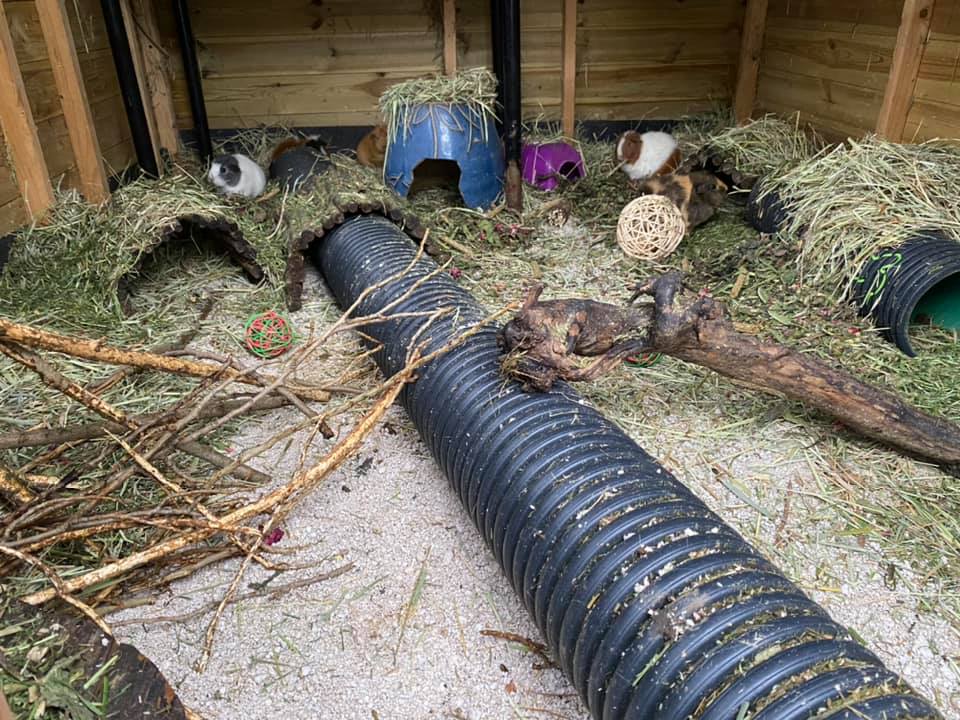General Information:
Unlike their name suggests, Guinea pigs are not from Guinea, nor are they biologically related to pigs, quite the contrary, in fact.
Guinea pigs are native to the lower slopes of the Andes mountains and local grasslands in South America. They’re social, chatty, active rodents who live in herds.
Interestingly, Guinea pigs aren't diurnal or nocturnal. Guinea pigs can be awake for approximately 20 hours a day, they scatter their resting periods somewhat intermittently throughout their activities. They usually display crepuscular behaviour, but can be active at other times as well.
They can live anywhere from 4-8 years in captivity but ages up to 14 years have been documented.
Care:
Housing/Enrichment:
Housing can vary depending on your circumstances. Guinea pigs can be kept indoors and outdoors.
Indoor Guinea pigs:
C and C cages are a great, affordable, and secure set up for indoor Guinea pigs. They need plenty of floor space – horizontal rather than vertical. Some say you can keep 2 Guinea pigs in 7.5sqft enclosure, but 10.5-30sqft is much preferred - especially when it comes to housing boars
As animal welfare standards improve, we believe the ideal minimum housing size should be around 20sqft.
Other options include custom made enclosures, or converting an room in your home.
Enrichment options are endless in today's market; you can have custom hides, hay boxes, gnawing toys - anything to encourage natural behaviours!
Useful Links:
Unlike their name suggests, Guinea pigs are not from Guinea, nor are they biologically related to pigs, quite the contrary, in fact.
Guinea pigs are native to the lower slopes of the Andes mountains and local grasslands in South America. They’re social, chatty, active rodents who live in herds.
Interestingly, Guinea pigs aren't diurnal or nocturnal. Guinea pigs can be awake for approximately 20 hours a day, they scatter their resting periods somewhat intermittently throughout their activities. They usually display crepuscular behaviour, but can be active at other times as well.
They can live anywhere from 4-8 years in captivity but ages up to 14 years have been documented.
Care:
Housing/Enrichment:
Housing can vary depending on your circumstances. Guinea pigs can be kept indoors and outdoors.
Indoor Guinea pigs:
C and C cages are a great, affordable, and secure set up for indoor Guinea pigs. They need plenty of floor space – horizontal rather than vertical. Some say you can keep 2 Guinea pigs in 7.5sqft enclosure, but 10.5-30sqft is much preferred - especially when it comes to housing boars
As animal welfare standards improve, we believe the ideal minimum housing size should be around 20sqft.
Other options include custom made enclosures, or converting an room in your home.
Enrichment options are endless in today's market; you can have custom hides, hay boxes, gnawing toys - anything to encourage natural behaviours!
Useful Links:
- www.burgesspetcare.com/gpaw/guinea-pig-welfare/environment/
- BSAVA Manual of Exotic Pets (fifth edition)
Outdoor Guinea pigs:
An outdoor environment for guinea pigs can be a fantastic option as you may have space to build something truly remarkable. Shed conversions
When considering housing Guinea pigs outdoors, make sure they are safe from extreme weather conditions and predators. Chicken wire is not fox proof. Safe temperatures are approximately 16°C -24°C and humidity should be 40%-70%. Guinea pigs are prone to heatstroke so be mindful of this during warmer weather.
An outdoor accomodation should be as large as your budget allows and certainly meeting the minimum requirements already discussed.
An outdoor environment for guinea pigs can be a fantastic option as you may have space to build something truly remarkable. Shed conversions
When considering housing Guinea pigs outdoors, make sure they are safe from extreme weather conditions and predators. Chicken wire is not fox proof. Safe temperatures are approximately 16°C -24°C and humidity should be 40%-70%. Guinea pigs are prone to heatstroke so be mindful of this during warmer weather.
An outdoor accomodation should be as large as your budget allows and certainly meeting the minimum requirements already discussed.
Socialising:
Guinea pigs are very social creatures, they benefit from companionship with their own kind. Sows (females) are usually easier to cohabit in larger herds. Boars (males) are best kept in pairs, but space if vital for their relationship.
Boars can be neutered and housed with sows.
Useful Links:
Never house Guinea pigs and rabbits together as they can seriously injure each other. It’s far more beneficial for both species to be housed with the same species
Diet:
Guinea pigs are true herbivores and their dietary needs can be complex and overwhelming to some. Low-calcium hays such as Timothy hay are by far the most important part of their diet and should be provided in unlimited amounts. Hay is essential for guinea pigs to resume normal bodily functions, and also allows them to gnaw.
Guinea pigs lack the enzyme L-gulonolactone oxidase, and are therefore unable to manufacture their own vitamin C. You must provide vitamin C through their diet. A lack of dietary vitamin C can lead to numerous health issues such as scurvy. The most common way to ensure your guinea pig is consuming vitamin C is by feeding a pellet which contain vitamin C (pay attention to expiry dates as vit C content does decline), via fresh greens, or even supplements - but you don't want to over-supplement - only 10mg/kg is required daily, this is should be increased to 35mg/kg for pregnant and sick individuals.
Avoid feeding excessive amounts of calcium in their diet, as it can predispose them to common diseases, such as urinary issues.
Health:
Many of the common diseases found in guinea pigs have a direct link to their husbandry. High care standards are essential for your pets' wellbeing. Here are some of the issues to be aware of:
Please feel free to ask more questions.
Guinea pigs are very social creatures, they benefit from companionship with their own kind. Sows (females) are usually easier to cohabit in larger herds. Boars (males) are best kept in pairs, but space if vital for their relationship.
Boars can be neutered and housed with sows.
Useful Links:
Never house Guinea pigs and rabbits together as they can seriously injure each other. It’s far more beneficial for both species to be housed with the same species
Diet:
Guinea pigs are true herbivores and their dietary needs can be complex and overwhelming to some. Low-calcium hays such as Timothy hay are by far the most important part of their diet and should be provided in unlimited amounts. Hay is essential for guinea pigs to resume normal bodily functions, and also allows them to gnaw.
Guinea pigs lack the enzyme L-gulonolactone oxidase, and are therefore unable to manufacture their own vitamin C. You must provide vitamin C through their diet. A lack of dietary vitamin C can lead to numerous health issues such as scurvy. The most common way to ensure your guinea pig is consuming vitamin C is by feeding a pellet which contain vitamin C (pay attention to expiry dates as vit C content does decline), via fresh greens, or even supplements - but you don't want to over-supplement - only 10mg/kg is required daily, this is should be increased to 35mg/kg for pregnant and sick individuals.
Avoid feeding excessive amounts of calcium in their diet, as it can predispose them to common diseases, such as urinary issues.
Health:
Many of the common diseases found in guinea pigs have a direct link to their husbandry. High care standards are essential for your pets' wellbeing. Here are some of the issues to be aware of:
- Ovarian Cystic Disease: Up to 66%-75% of sows will have ovarian cysts. These cysts are associated with elevated hormone levels, which comes with significant symptoms, such as; irregular reproductive cycles, infertility, persistent heat, and hair loss. They can contribute to serious uterine disorders and cancer. For this reason, we electively perform ovariectomies (removal of the ovaries) on all sows in rescue. This results in less surgical complications, and prevents undue suffering.
- Urinary Disease: Urinary issues in guinea pigs are common and often include; cystitis, urolithiasis, and bacterial infections. Diets high in calcium can be a leading cause for uroliths (stones) to develop. These stones often require cystotomy to correct, but can be a reoccurring issue if husbandry isn't amended.
- Respiratory Disease: Guinea pigs are prone to numerous respiratory pathogens which can result in infections, pneumonia, and more. Good husbandry free from overcrowding, high humidity and dirty enclosures is paramount to preventing such diseases. Guinea pigs must not be housed with rabbits, as they are frequent carriers of bordetella, which is often fatal in guinea pigs.
Please feel free to ask more questions.





